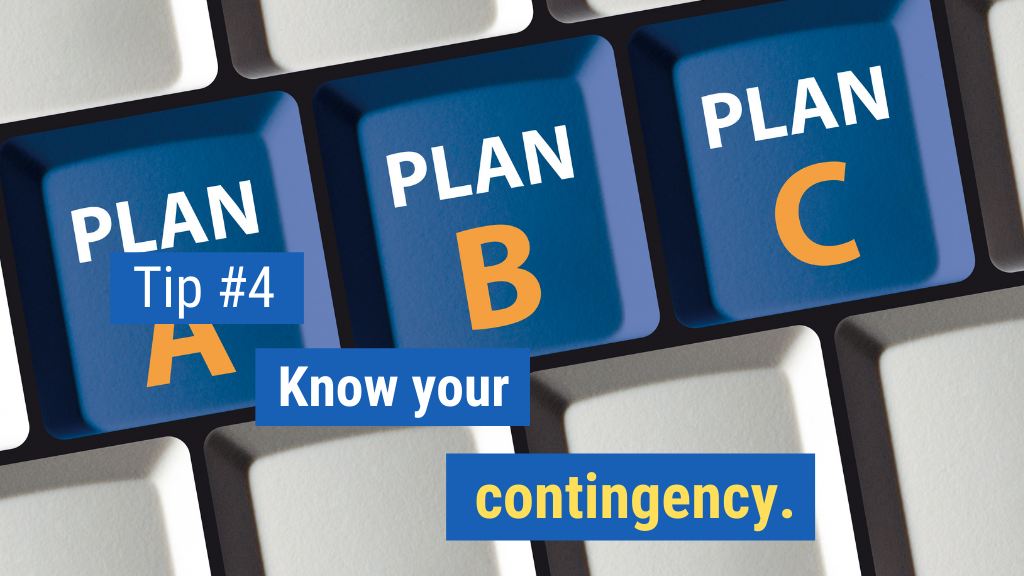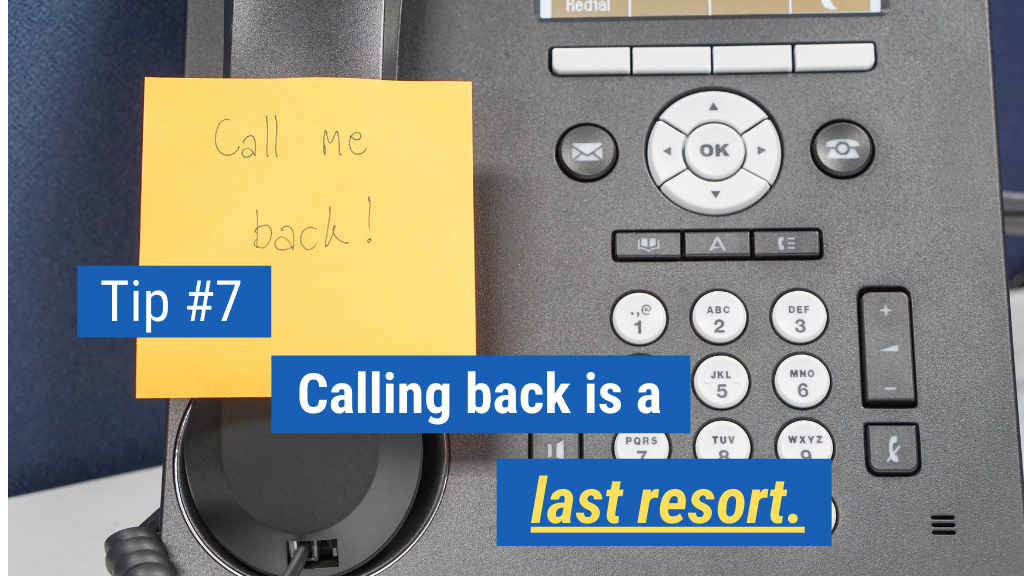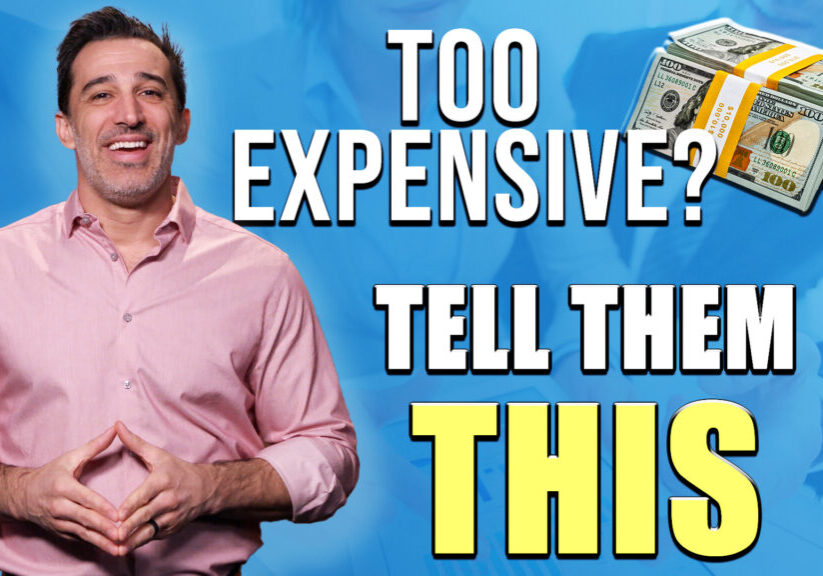I’m willing to bet you’ve been in a selling situation before where the prospect said the following dreaded words: “I don’t have time.”
Or maybe they said it a bit differently—“Now isn’t a good time” and “Can you try me back later?” are equally common objections early on in prospecting calls.
The important question is, what do you say in response?
If you’re making a lot of prospecting calls, you’re going to hear this type of pushback all the time.
It’s really one of the most common early-stage sales objections out there. That’s why having an approach in place to overcome this objection is so critical. You must always know how to respond to “I don’t have time.”
You can’t just say, “Okay, when would be a good time to try you back?” because the prospect is just going to say anything they can to get off the phone with you, and you’ll never hear from them again.
So, what should you say?
In this video, I’m going to show you exactly what to say and how to handle it when a prospect says, “I don’t have time…” Check it out:

Prospect Says, “I don’t have time…” Tip #1: Have a tight script.

This first step is actually a way to entirely avoid a situation where a prospect says, “I don’t have time…” By having a really tight call script, you’re going to be so much less likely to hear this kind of an excuse from prospects.
The main reason most salespeople are getting pushed off the phone is that they’re sloppy, haphazard, and all over the place with their conversation once they get a prospect on the line.
In fact, most salespeople launch into a meandering, salesy, old-school pitch that’s some version of, “I’d love to tell you more about my product…” A tight script with real value will help you avoid falling into this common trap, and keep you from droning on without any structure, which turns prospects off and makes them want to get away. This is why they resort to saying, “I don’t have time…” in an attempt to quickly get off the phone. Understanding what is actually happening the the key to solving this high-priority issue.
Since these pushback scenarios where a prospect says, “I don’t have time…” are so prevalent and predictable early on in prospecting calls, set yourself up for success ahead of time by putting a tight call script in place to help you avoid dealing with them in the first place.
“I don’t have time…” Tip #2: Break the pattern.

This tip plays off of that first idea of having a tight script in place. When you’re starting a phone call with a prospect, you want to break the pattern right away. This means you want to have an opening in your script that’s a little bit unique and unexpected.
For example, the vast majority of salespeople start their prospecting calls with, “Hey, George. Marc Wayshak calling. How are you today?” To break the pattern of this expected opening, try saying something just slightly different, such as, “Hey, George. Marc Wayshak calling. How have you been?”
If you start your calls with the usual, “Hey, how are you today?” opening, prospects will immediately resort to the pattern they typically use to get salespeople off the phone, because they’ve heard it a million times before. What is common turns more prospects off quickly.
Shake things up by tweaking your opening language just slightly, and you’ll be surprised at how effective it is at throwing prospects off guard, enabling you to get just a step further in the conversation without an early-stage objection.
How to respond to, “I don’t have time…” Tip #3: Open with value.

Once you’ve broken the pattern and avoided the typical, “How are you today?” opening, it’s time to open with value. This is absolutely key to avoiding the common early-stage objection where a prospect says, “I don’t have time…” because it shows right away that the conversation is going to be totally focused on them.
If your opening statement is something like, “My name’s Marc Wayshak. I’m with the Sales Insights Lab and I want to show you all the awesome stuff that we can do to help your company!” then your prospects are immediately going to try to get off the phone. When a prospect accidentally answers your cold call, their initial goal is going to be to get off the phone as quickly as possible, especially if your are not bringing real value.
Instead, open with value that demonstrates you understand the challenges they’re likely facing, and provide some real insight up front.
Simply draw on your bird’s-eye-view of the prospect’s industry to do this. If you can successfully open with value, the prospect will think, “Okay, I’ll hear this person out,” instead of trying to run away as fast as possible.
That’s what avoiding these potential early-stage objections is all about: showing the prospect as quickly as possible that you’re not just like every other salesperson out there, and you have something of value to share.
Tip #4: Know your contingency.

Let’s say you have a tight call script in place, you break the pattern, and you open your call with value. And still, you find yourself in a situation where a prospect says, “I don’t have time…” It happens—and the first and most important thing to do next is to know your contingency.
Let’s first explore what most salespeople are going to do in this unfortunate sales situation. The vast majority will say something like, “Okay, that’s fine. When would be a good time for me to try you back?” Then the prospect will say something vague like, “Sometime next week,” to which the salesperson will reply, “Sure, what day is best for you?” The prospect will name a random day, the salesperson will agree, and then the conversation will end.
In this common scenario, the salesperson is now left with a follow-up call to make on a random day the following week, not at a scheduled time, without a real calendar invite, and with zero actual commitment on the part of the prospect.
We all know the prospect is never going to show up for that call. Your number will be screened by that prospect forever.
To avoid this predictable pitfall, simply know your contingency and use it whenever you hear the objection, “I don’t have time…” Make sure it’s a strong contingency. We’ll cover that next.
Prospect Says, “I don’t have time…” Tip #5: Ask for 30 seconds.

The best contingency to use when a prospect says, “I don’t have time…” is one that will buy you another 30 seconds of time on the phone.
Remember, most prospecting calls are all about getting to that next 30 seconds of the conversation without the prospect hanging up the phone. Then, once you finally get the prospect truly engaged, you’re in the clear.
A great contingency that we use at my own firm when a prospect says, “I don’t have time…” is something like: “You know what, George? That sounds totally fair, but would it be okay if I took 30 seconds to tell you why I called? If after that it doesn’t make sense to talk, we can just hang up. Sound fair?”
This is really assertive, but at the same time, completely reasonable. Most of the time, prospects respond to this contingency with a simple, “Okay, fine. 30 seconds. What’s up?”
And now you’ve successfully gotten to the next 30 seconds of the call.
How to respond to, “I don’t have time…” Tip #6: Be super firm.

Prospecting calls are not for the faint of heart. This is not an area where weak people succeed. You need to be strong. You need to be firm.
Your prospects will actually respect you much more if you’re firm and assertive because they’re used to salespeople who just fall over and acquiesce at the slightest sign of an objection early on.
If you’re super firm with your prospects by using a contingency like the one I just shared in the tip above, your prospects will think, “This person’s not a pushover.” And they’re going to respect you right away. If a prospect respects you, they’re much more likely to stay on the phone with you just a little bit longer. Be super firm, especially in any situation where a prospect says, “I don’t have time…”
Prospect Says, “I don’t have time…” Tip #7: Calling back is a last resort.

This is really a mindset you must have in order to effectively deal with situations where a prospect says, “I don’t have time…” It’s a commitment you have to make to yourself. Saying, “When would be a good time for me to call you back?” must be an absolute last resort for you. Commit to that right now.
Of course, in very extreme situations, you may have to resort to this response. For example, if a prospect hits you with an intense objection like, “This isn’t a good time. Someone in my family just died,” then, of course, you simply say, “I’m so sorry to hear that. Just let me know when would be a better time to connect and I’ll reach back out.” There’s nothing else you can really do there.
But in the vast majority of cases, you want to avoid ever saying anything about calling back the prospect at a later time. Keep in mind that the objection, “I don’t have time…” is pretty much always just a nice way of prospects saying they never want to hear from you ever again. That’s why calling back later must be an absolute last resort.
So, there you have it. Now you know exactly what to say and how to handle it when a prospect says, “I don’t have time…” Be sure to share your thoughts in the comments section to join the conversation.

Enjoyed this article? Please share away!

Get instant access to our free sales training:
Why Prospects Push Back on Price, Give 'Think-It-Overs,' and Ghost in Sales Until They Meet a Sales Superstar Who Is Following These 7 Simple Keys

About the Author Marc Wayshak
Marc is is the best-selling author of three books on sales and leadership, including the highly acclaimed titles Game Plan Selling, The High-Velocity Sales Organization and his forthcoming book, Sales Conversations, Mastered.
Marc is a contributor to Inc, HubSpot, Fast Company, Entrepreneur Magazine, and Huffington Post Business. He also hosts a popular YouTube channel on sales strategy with over 103,000 subscribers.
Marc helps thousands of people his data-driven, science-based approach to selling that utilizes all the best tools available to sales organizations today.



![How-to Sell to Power [C-Suite Sales Must-Knows!] How to Sell to Power [C-Suite Sales Must-Knows!]](https://salesinsightslab.com/wp-content/uploads/bb-plugin/cache/How-to-Sell-to-Power-C-Suite-Sales-Must-Knows-1024x576-landscape-7a52c541b28a7b772ad9e1010d8240be-.jpg)


![The Absolute Best Way to Start a Sales Conversation [WITH ANY PROSPECT] The Absolute Best Way to Start a Sales Conversation [WITH ANY PROSPECT]](https://salesinsightslab.com/wp-content/uploads/bb-plugin/cache/The-Absolute-Best-Way-to-Start-a-Sales-Conversation-WITH-ANY-PROSPECT-1024x576-landscape-be9d9379ab94d9f71b5bfeed42246a84-.jpg)